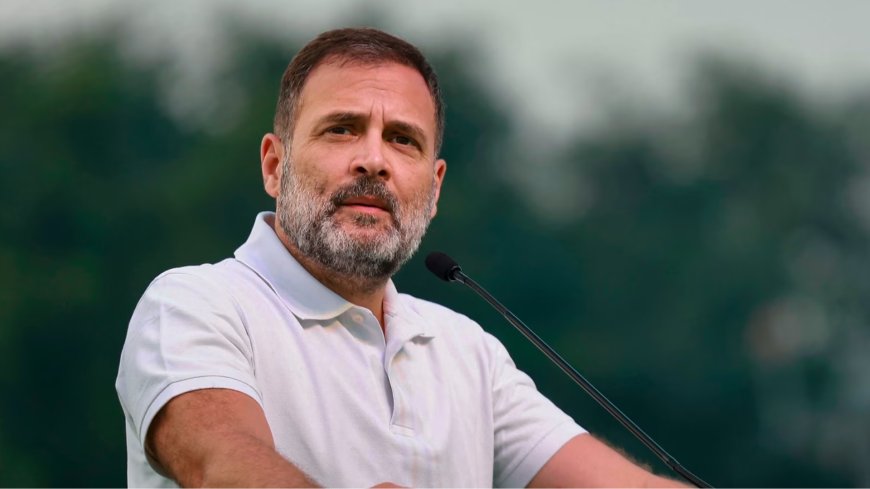Rahul Gandhi and the Citizenship Controversy: Legal Challenges Resurface Amid Political Crossfire
Rahul Gandhi faces renewed legal scrutiny over his alleged dual citizenship claims. Dive into the details of the case, legal developments, political reactions, and constitutional implications.

Rahul Gandhi Faces Legal Challenges Over Citizenship Row: What You Need to Know
New Delhi, May 29, 2025 — Congress leader Rahul Gandhi is once again at the center of a legal and political storm, with the debate over his alleged foreign citizenship status reigniting tensions ahead of key electoral events. This latest development follows a fresh legal petition questioning his eligibility to hold public office under Article 102 of the Indian Constitution.
The citizenship row, which has followed Gandhi intermittently for nearly a decade, stems from accusations that he once declared himself a British national in corporate filings overseas — a claim the Congress party vehemently denies.
Let’s take a closer look at the origins of the controversy, the legal arguments in play, and its broader political ramifications.
The Origin of the Citizenship Allegations
The issue first gained traction in 2015, when Subramanian Swamy, a senior leader of the Bharatiya Janata Party (BJP), alleged that Rahul Gandhi had listed his nationality as "British" in documents filed for Backops Limited, a now-defunct company registered in the UK.
Swamy submitted a detailed complaint to the Home Ministry, citing filings from the UK’s Companies House. He claimed that Gandhi’s status as a director of the company — with documents referencing him as a British citizen — violated Section 9 of the Indian Citizenship Act, 1955, which prohibits Indian citizens from acquiring dual citizenship.
The complaint also referenced Gandhi’s alleged violations of the Representation of the People Act, raising concerns about the constitutional legitimacy of his position as a Member of Parliament.
You can review the UK filing records via Companies House UK.
Legal Proceedings and Government Action
In 2020, the Ministry of Home Affairs (MHA) sent a notice to Gandhi seeking clarification about his citizenship status. At the time, he responded that he has "always been an Indian citizen" and that any references to British citizenship were merely clerical errors in foreign business documents.
The matter cooled down temporarily. However, a Public Interest Litigation (PIL) was recently admitted in the Delhi High Court in early May 2025, demanding a judicial inquiry into the matter.
Legal experts believe the petitioners are relying on the interpretation of Section 9 of the Citizenship Act, which states:
"Any citizen of India who voluntarily acquires the citizenship of another country shall cease to be a citizen of India."
For legal precedents, see Supreme Court of India judgments involving dual nationality and electoral disqualification cases.
Congress Party’s Response
The Indian National Congress has condemned the latest legal revival as "politically motivated", asserting that the allegations are part of a broader campaign to discredit Gandhi ahead of key parliamentary sessions and upcoming elections.
Congress spokesperson Jairam Ramesh stated:
"Rahul Gandhi has never held any other citizenship. These repeated efforts to manufacture falsehoods are designed to distract from real national issues."
Party leaders have pointed out that Gandhi has contested multiple Lok Sabha elections, been cleared by the Election Commission of India, and has never been found in violation of Indian nationality laws.
To follow Congress Party’s official communications, visit INC official site.
Political Fallout and Public Discourse
The BJP has leveraged the controversy to question Rahul Gandhi’s patriotism, especially after his high-profile visits to Cambridge and Stanford, where he made critical remarks about Indian institutions. BJP leaders argue that transparency about his citizenship is essential for public accountability.
Meanwhile, political analysts suggest that this controversy may energize both bases. For BJP, it reinforces the "outsider" narrative, while for Congress, it could be used to frame Gandhi as a target of institutional harassment.
For a deeper political analysis, refer to this piece by The Print.
What the Constitution Says
The Indian Constitution does not permit dual citizenship. Article 102(1)(d) states that a person shall be disqualified for being chosen as, and for being, a member of either House of Parliament:
“If he is not a citizen of India, or has voluntarily acquired the citizenship of a foreign State.”
Legal experts caution, however, that intent and voluntariness are difficult to establish in such cases, especially when corporate documentation may involve standard templates or administrative inputs.
Constitutional commentary available on PRS Legislative Research provides more insights on disqualification norms and citizenship laws.
What Happens Next?
The Delhi High Court has directed the Ministry of External Affairs and the Ministry of Home Affairs to submit a joint response within the next 30 days. Meanwhile, the matter is being closely monitored by the Election Commission of India, which may also seek clarity before the 2026 General Elections.
If the court finds credible evidence of voluntary foreign citizenship, Gandhi could face:
-
Disqualification from Parliament
-
Criminal proceedings under the Representation of the People Act
-
Revocation of Indian citizenship (if proven)
These outcomes, however, are speculative at this stage. Most legal analysts believe the case will hinge on how the court interprets the intent behind foreign documentation and whether it constitutes "voluntary acquisition" of another nationality.
Final Thoughts
Rahul Gandhi’s citizenship row is not just a legal issue — it’s a political flashpoint that symbolizes the polarized nature of Indian democracy today. While the courts are yet to deliver a verdict, the renewed scrutiny is likely to affect electoral narratives, public trust, and institutional credibility in the months ahead.
Regardless of the outcome, this episode underscores the growing intersection of legal mechanisms and political maneuvering in India’s high-stakes electoral landscape.
For live legal updates and full court proceedings, follow the Live Law India Portal.



















































